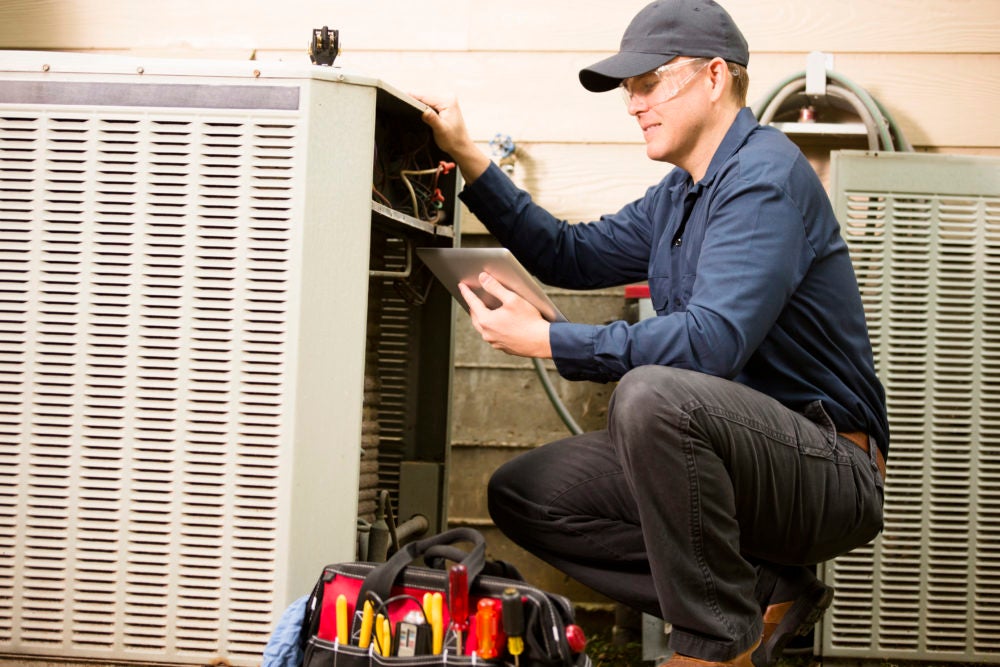We often get asked what the difference is between home insurance and home warranty. In researching this topic, we reviewed the differences in home warranties versus homeowner’s insurance in terms of contracts, coverage, and costs.
It’s important to know the difference between homeowners insurance and a home warranty. Both are important in helping you deal with unexpected issues that could be costly, but each provides peace of mind in different scenarios.
In our guide below, we’ll explain to you why each home protection plan is important in their own ways and why you need both.

What is homeowners insurance?
If you have a mortgage on your home, then you’ll have to have home insurance. Your mortgage lender requires it as a way to protect their interest in the property.
Homeowners insurance covers damage to your home’s structure in cases of peril deemed in your insurance policy. “Perils” include fire, lightning strikes, tornadoes, and hail.
If your home becomes uninhabitable due to the perils listed above—or similar disasters outside of your control—your homeowners insurance might also cover short-term housing costs.
Beyond structural damage, homeowners insurance also includes liability, or coverage provided to the homeowner if someone is injured on the property.
It will also replace your personal belongings in the event of disaster, theft, or vandalism.

What is a home warranty?
You might be wondering what constitutes a home warranty, here it is. A home warranty is a residential service contract that covers major systems and appliances within your home, such as HVAC, plumbing, electrical, dishwashers, clothes washers, and dryers.
You will have the option to buy a home warranty when you close on a house, but a warranty is not required by mortgage lenders in order to complete a home sale. In fact, you can purchase—and cancel—a home warranty plan whenever you want.
A home warranty is an annual plan that protects homeowners from paying exorbitant repair and replacement costs in the event that a home system or appliance breaks down due to normal wear and tear. Instead of the full cost to repair or replace an appliance, you’ll be charged a relatively small service fee. This goes to the professional contractor who your trusted home protection company will vet, hire, and assign to the job for you. This is why Today’s Homeowner recommends a home warranty, especially with a trustworthy home protection company.
Coverage
While homeowners insurance covers structural damage from life-changing events such as natural disasters and burglaries, a home warranty will cover most systems and appliances within your home when they fail from normal wear and tear. So, what’s covered by a home warranty company is totally different from what’s covered by a home insurance company.
| Home warranty | Home insurance |
| Major systems, like your HVAC, electrical, and plumbing | Structural damage from severe weather and natural disasters |
| Major appliances, like your refrigerator, stove, and dishwasher | Theft |
| Additional coverage for your swimming pool or hot tub | Liability if someone gets injured on your property |
To better explain the difference, let’s walk through a few scenarios featuring systems that often have problems and that can be quite expensive to repair.

Roof leak repair or replacement scenario #1
A massive thunderstorm with heavy winds downs limbs in your yard. Several land on your roof and this results a major roof leak. You have both home insurance and a home warranty—which customer service line do you call?
The answer is home insurance. This is a situation that was caused by a hazardous weather condition.

Roof leak repair or replacement scenario #2
A water ring is forming in the ceiling of the living room. You go outside to see if anything looks amiss and it appears that a few shingles have come loose. A small leak can turn into a big problem, so you want to get it taken care of quickly. You have both home insurance and a home warranty with roof coverage—which customer service line do you call?
The answer is a home warranty. Seemingly, this is just normal aging of the roof. A home warranty company will repair shake, shingle, and composition roof leaks. Read your contract for full details on this important add-on coverage.

Air conditioning repair or replacement scenario #1
You hear a massive thunderclap, then a huge “zap” and “pop”—lightning just knocked out your air conditioner. You have both home insurance and a home warranty—which customer service line do you call?
The answer is home insurance. You may think a lightning strike sounds far-fetched, but the Insurance Information Institute reports that over 100,000 home insurance policyholders had lightning claims in 2016. If this happens to you, home insurance is who you would want to talk to first.

Air conditioning repair or replacement scenario #2
It’s 91 degrees outside and inside, it’s just as hot. The AC is running but the house isn’t cooling down. You have both home insurance and a home warranty—which customer service line do you call?
The answer is a home warranty. If your air conditioning unit is struggling or just not working, your service request would be to your home warranty company as most plans cover air conditioner repair or replacement.
As you see from these examples, homeowner’s insurance is hazard insurance, and only covers items damaged in natural disasters and through vandalism or theft. All are events that we hope won’t happen to you.
On the other hand, a home warranty repairs household appliances and mechanical systems that fail due to normal wear and tear, which is unfortunately inevitable.
Cost
Home warranty
A home warranty can save you thousands of dollars in the long run. It protects you from paying pricey repair costs when a covered item breaks down.
When you purchase a home warranty, you’ll pay a premium either an annual amount upfront or in monthly installments.
Neither the age and brand of your covered items nor the age or size of your home should affect your premium. Home warranty premiums vary by your home’s location and the level of coverage you choose.
Then, for each claim that’s approved, you’ll pay the provider’s pre-approved contractor a fairly small service fee when they arrive at your home to assess the problem.
Exclusions and limits do apply to home warranties. Each home warranty company sets its own cap on coverage. This is a dollar amount that the home warranty company will pay per claim or covered item. This means that the full repair or replacement cost might not be covered and you will have to foot the rest of the bill.
For example, the average cost to replace a refrigerator is $1,925 but the average coverage cap of this appliance is $1,305. In this case, the homeowner will pay $620, which is still a pretty good deal for a brand new refrigerator if you ask us.
Home insurance
You may not remember paying for your homeowners insurance. That’s because it’s probably bundled with your mortgage payment each month.
It’s worth breaking down your mortgage payment to find out how much you’re paying for home insurance. You might be able to get a better deal under the following circumstances:
- You’re able to bundle your home and car insurance policies for a discounted rate
- You’ve made home security improvements since buying your home
- Your credit score has improved
- You’ve been insured by the same provider for three years or longer
- Your assets have lost value
In addition to your premium, you’ll still have to pay a deductible before insurance will chip in on damages. Many homeowners opt for a higher deductible in order to lower their monthly premium. If this is the case, you could end up paying thousands of dollars before insurance steps in.
Just like home warranties, home insurance has limitations too. Three out of every five Americans don’t know that they’re underinsured.
Famous financial advisor Dave Ramsey suggests that you buy enough home insurance to rebuild your home, replace your most valuable personal belongings, cover injuries that occur on your property, and reimburse your living expenses in the case that your home becomes uninhabitable.
The size and security of your home, the value of your property and belongings, and the location of your home will all affect your premium. For example, Florida and Texas homeowners pay 80–90% more than the national average because those states are more susceptible to natural disasters, like tornadoes and tropical storms.
| Home warranty | Home insurance | |
| Premium | $25–$67 per month | $600–$2,000 per year |
| Service fee/deductible | $75–$125 per claim | $500–$10,000 per year |
| Pay-out limit | $300–$3,000 payout per covered item | $200,000 on average |
| Cost factors | Location of your home and level of home warranty coverage | Your property’s size, value, security, and location |
Bottom line
Owning real estate is an American dream, but it can come with financial worries about the unexpected cost of repairs if major systems and appliances stop working. Home repairs don’t need to be the cause of homeownership anxiety, especially if you have the dual protection of both home insurance and a home warranty.
The bottom line is that you’ll get more use out of a home warranty. You could go a lifetime without making a home insurance claim whereas the average homeowner files two home warranty claims per year.
We, at Today’s Homeowner, believe it’s a good idea to get a home warranty on top of your homeowners insurance. Appliances and systems will inevitably break over time and home insurance does not cover normal wear and tear. It’s more likely these items will break due to normal wear and tear than being stolen or damaged by a natural disaster.
Summary of home warranty vs home insurance
| Home warranty | Home insurance | |
| Requirements | Optional | Required |
| Coverage | Most major appliances and systems | Structural damage, property loss, liability, and short-term housing costs |
| Exclusions | Items must fail due to normal wear and tear, not improper installation, modification, or maintenance | Limited to perils named by the insurance policy |
| Cost | $25–$67 per month | $600–$2,000 per year |
| Payment structure | Monthly installments or one-time annual fee | Bundled with monthly mortgage payments |
| Coverage length | 12 months with the option to renew or cancel at anytime | You must let your mortgage lender know before you cancel or change your policy |
Looking for more information on home warranty companies? Check out some of our other expert reviews to get all the details you need. Remember, each of these companies gives a free quote.












